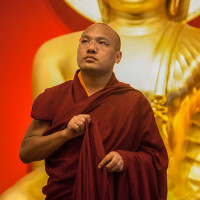Freedom is a powerful idea. But I am not sure we are always very clear what we have in mind when we speak of it. Does freedom mean doing whatever we feel like in any given moment? Does it mean having the power and liberty to exercise our will with no obstruction? Does it evoke a state in which we have shed ourselves of all obligations to others?
Many of our notions of freedom are based implicitly on the idea that we are utterly self-sustaining and separate entities. This model leads us to feel that others’ claims on us undercut our freedom. We experience our relationships as ties that bind us and limit our freedom. Based on this, we assume that we cannot all be free, because the freedom of one person comes at the cost of another’s. If we believe that, it is small wonder that people so often seek to dominate and oppress others. This is an idea that slips into discussions of freedom — the idea that freedom is in some fundamental way a limited resource, such that one person exercising his freedom detracts from another person’s ability to be free. But this is not the case. Freedom is not a zero-sum game.
It is possible and realistic for every person to experience real freedom. The reason we have not managed to do so is we lack an understanding of what real freedom is and how it can be achieved. We need the wisdom to distinguish the egocentric pursuit of self-interest from the pursuit of authentic freedom.
When I hear what people say about freedom sometimes, it sounds to me like longing to live out the fantasy of being independent and absolutely autonomous individuals, of being free of consequences and responsibilities—that is to say, exempt from the principle of interdependence. But there is no such thing. We cannot exist outside causality or outside the connections of interdependence, and so freedom cannot be a matter of escaping from those connections.
Only freedom developed on the basis of a realistic view of who we are and how we relate to others can be authentic — and extended universally to all. If we acknowledge our interdependence, and take into account the vast networks of interconnections in which our lives and actions are embedded, we will find that our own freedom is inseparable from the freedom of all other people. When we truly appreciate this fact, we experience interdependent freedom — a freedom that does not detract from others’ freedom. This is the freedom that we can all enjoy together without conflict.

17th Karmapa
from the book
source: http://www.wisdompubs.org/blog/201701/17th-karmapa-authentic-freedom
Read a random quote or see all quotes by the 17th Karmapa.
Further quotes from the book Interconnected :
- Individualism or interdependence
- A genuine sense of affection
- The power of our senses
- Gratitude
- Self-discipline
- The full vividness of direct contact
- Dismantling the walls that separate us
- Inner conditions of interdependence
- You exist in connection with others
- Extend yourself and connect
- The opportunity to love
- Remaining indifferent to the suffering of animals
- Time to act
- Our life is like a vast net
- The air we breathe
- Extending gratitude in all directions
- The imagination to see the other as free and happy
- An important source of closeness and love
- Knowing more is not a substitute for feeling more
- Self-reliance